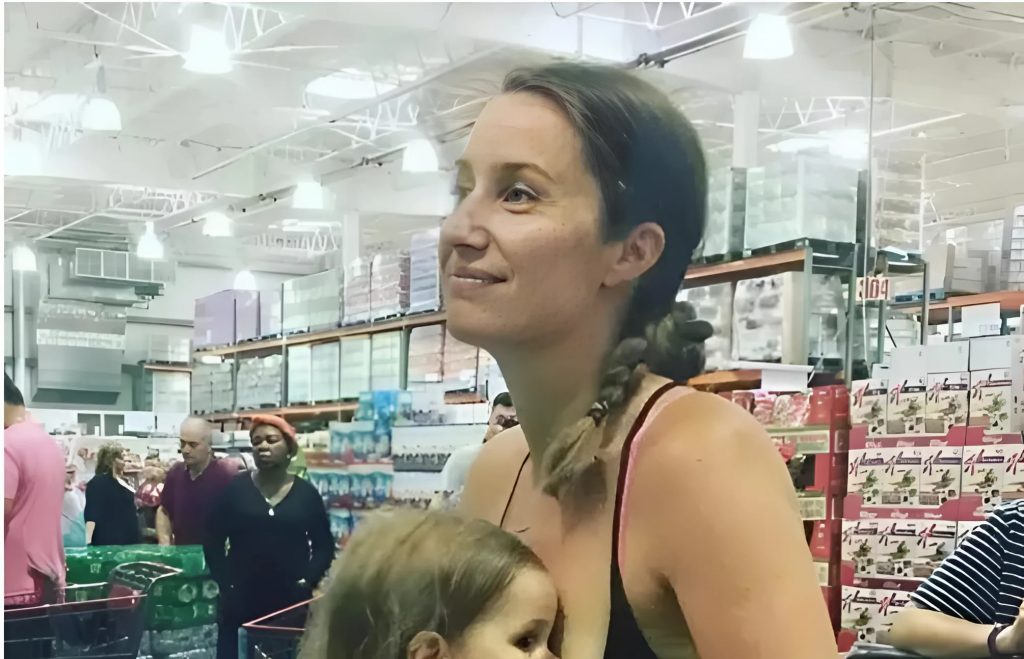In the middle of a busy afternoon, between the sound of squeaky carts and hurried footsteps, a mother sits quietly on a bench near the produce section. Her shopping bag rests at her feet. Her baby, only a few months old, is nestled in her arms, fussing for milk.
Without hesitation, she lifts her shirt and begins to breastfeed.
A simple, nurturing act — ancient, instinctive, necessary. And yet, someone takes a photo. That photo is shared online. Within hours, it explodes across social media, igniting a wave of admiration, but also an unexpected backlash.
“Breastfeeding in public: brave or inappropriate?” the caption reads.
Thousands of comments follow.
“Beautiful moment between a mother and child.”
“Every mom should feel this free.”
“She could’ve covered up.”
“This isn’t the place for that.”
The debate is familiar. The reactions predictable. But the deeper question remains: Why, in an age of progress and openness, does breastfeeding in public still provoke such discomfort?
A society that praises mothers — as long as they stay invisible
We live in a world that celebrates motherhood. Politicians applaud it. Doctors encourage it. Campaigns call it noble and sacred. Breastfeeding, in particular, is held up as the gold standard of infant care — natural, beneficial, essential.
But when a woman chooses to do exactly what she is praised for — and does so outside the privacy of her home — she’s suddenly subject to scrutiny.
She’s told to find a better place. She’s asked to be discreet. She’s reminded that someone might be “uncomfortable.”
Yet no one asks the baby if hunger can wait.
The exhaustion no one sees
The mother in the supermarket wasn’t seeking attention. She wasn’t staging a protest. She was simply tending to her baby’s basic need — food, comfort, connection.

Her day, like many others, was probably filled with errands, interrupted sleep, and the quiet mental load of motherhood. Sitting for a moment to feed her baby was not a public statement. It was a moment of necessity.
But when even that moment becomes controversial, it shows just how deep our societal contradictions run.
The problem isn’t the breast — it’s how we see it
We’re surrounded by images of the female body. Billboards, ads, movies, social media — all full of polished, edited, idealized depictions of women.
The same society that consumes sexualized content without blinking seems deeply offended by a breast used for its actual biological purpose.
What does that tell us?
It tells us the issue isn’t exposure. It’s control.
A woman’s body is accepted when it’s pleasing to others. But when she uses it for herself — or her child — it becomes “too much.”
A photo that became more than a photo
That single image, shared online, became a mirror for something bigger: the discomfort society still has with visible motherhood.
It revealed how quickly admiration for mothers turns to judgment when the act of care becomes public. It asked people to confront their biases: Why are we still policing where and how women feed their children?
It also sparked conversations — about autonomy, shame, dignity, and the double standards that still shape everyday life.
The mother speaks
When interviewed later, the woman remained calm and unapologetic.
“I wasn’t trying to make a statement,” she said. “My baby was hungry. I fed him. I didn’t have time to go find a private corner. And honestly, I don’t think I should have to.”
No slogans. No drama. Just honesty.
She wasn’t fighting. She was living.
Let’s stop hiding what’s natural
Breastfeeding is not performance. It’s not rebellion. It’s not provocation.
It’s care. It’s bonding. It’s survival.
And no woman should have to choose between meeting her child’s needs and meeting society’s expectations.
We can — and must — do better. That means not just allowing public breastfeeding, but normalizing it. Not just tolerating it, but respecting it.
